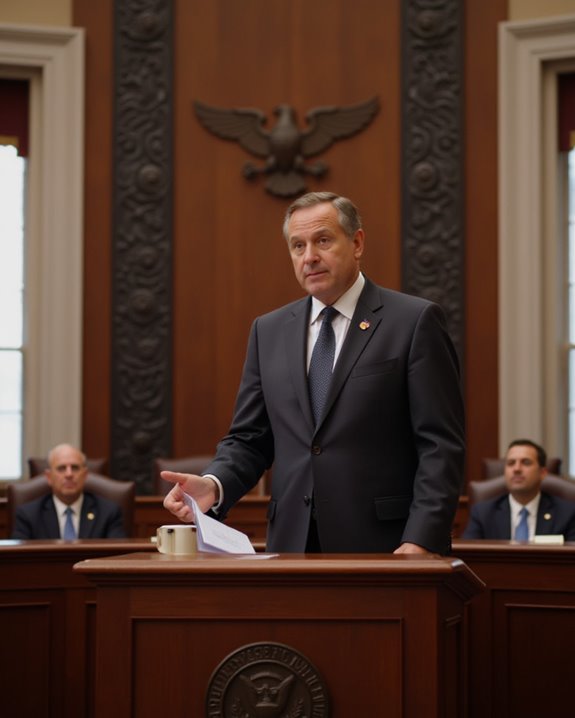Mike Johnson is the current Speaker of the House of Representatives, elected on October 25, 2023. As Speaker, he holds constitutional authority from Article I, Section 2, Clause 5 to preside over the House, maintain order during sessions, and administer oaths to representatives. Johnson, a Republican first elected to Congress in 2016, emerged as a compromise candidate after significant leadership turmoil. His position places him second in presidential succession, following the Vice President. Further exploration reveals the speakership’s complex evolution since 1789.
Key Takeaways
- Mike Johnson is the current Speaker of the House of Representatives, elected in October 2023.
- Johnson emerged as a compromise candidate after leadership turmoil and multiple failed votes for other candidates.
- He was first elected to Congress in 2016 and previously served as vice chair of the Republican Conference.
- As Speaker, Johnson is second in the presidential line of succession after the Vice President.
- Johnson is considered one of the least experienced Speakers in recent history, elected after rivals withdrew.
Constitutional Role and Powers
The Speaker of the House derives authority directly from the U.S. Constitution under Article I, Section 2, Clause 5, which establishes this pivotal leadership position. The house elects its Speaker at the beginning of each Congress, requiring a majority of votes, though surprisingly, this individual need not be a member of the House. Once selected, the Speaker administers the oath of office to representatives and assumes critical administrative and procedural functions.
Among the Speaker’s roles and responsibilities are maintaining order during sessions, recognizing members for debate, and ensuring orderly legislative proceedings. The Speaker may personally preside over the chamber or delegate this duty. Significantly, the Speaker holds significant national importance through placement in the presidential line of succession, positioned directly after the Vice President in presidential succession protocols as established by federal law.
Selection Process and Eligibility Requirements
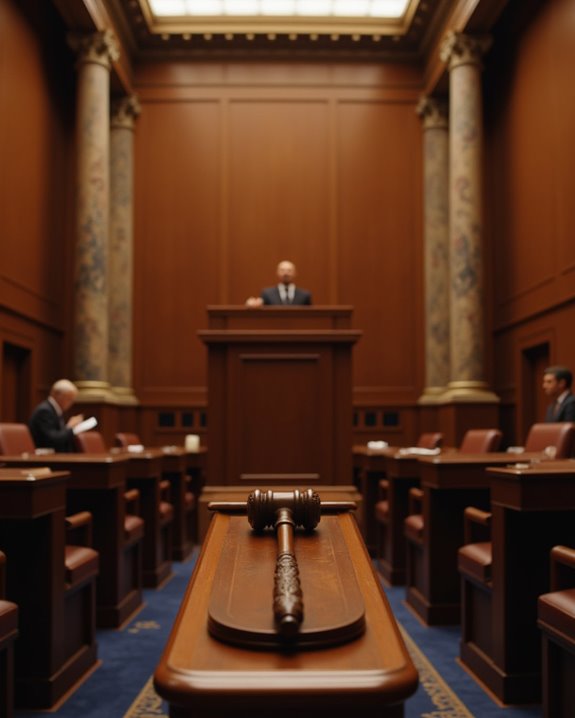
Selecting a new Speaker of the House involves a formalized voting procedure conducted at the beginning of each new Congress, typically following general elections held every two years. The process begins with each party nominating its candidate, usually from the body’s majority party, followed by a roll call vote where representatives declare their choice. If no candidate secures a majority, the roll call is repeated until the House has elected someone to the position.
While the Constitution establishes no explicit eligibility requirements regarding House membership, tradition has firmly established that the Speaker comes from among incumbent members of the House. Since 1789, every Speaker has been a sitting representative, though non-members have received votes since 1997. A Speaker can be removed from the position through a motion to vacate passed by the chamber.
Historical Evolution of the Speakership
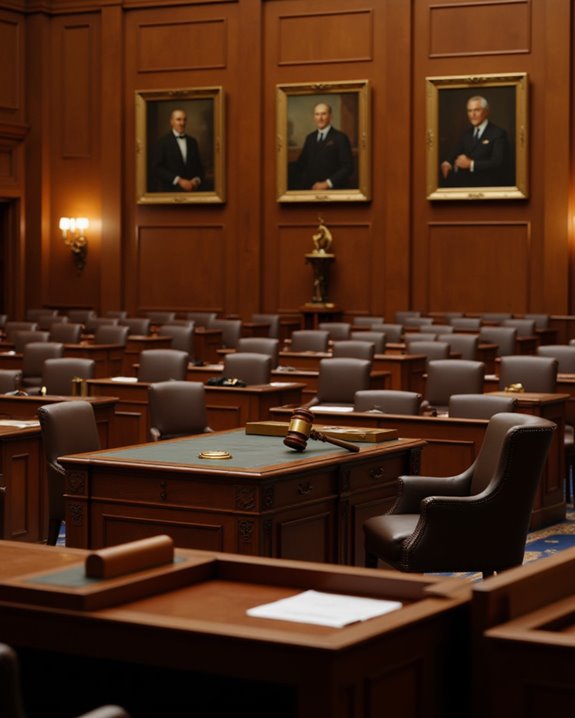
Formalized in 1789 under the Constitution’s framework, the Office of Speaker underwent significant transformation throughout American history, evolving from a relatively modest parliamentary role into one of the most influential positions in government. Frederick Muhlenberg established foundational precedents as the first House speaker, while subsequent leaders expanded the position’s authority. Henry Clay‘s time as speaker during the early 19th century demonstrated how the role could shape national policy through strategic compromise.
Current Speaker Mike Johnson’s Path to Leadership
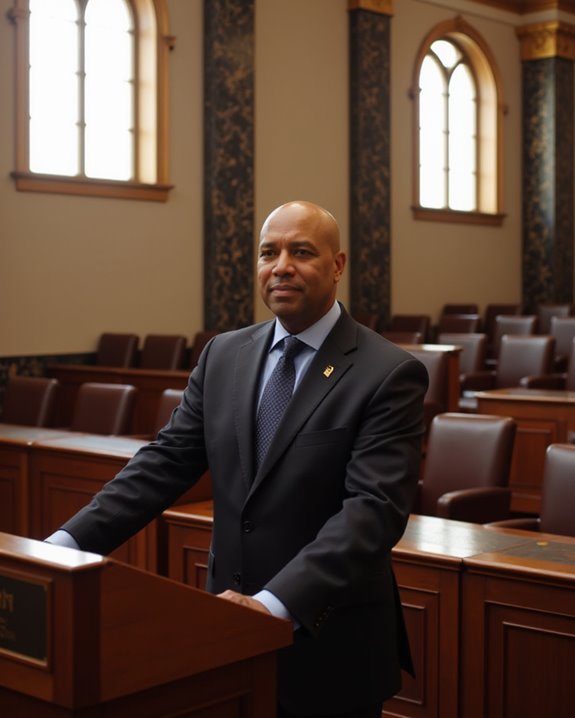
Louisiana representative Mike Johnson ascended to the speakership in October 2023 following an unprecedented period of leadership turmoil in the House of Representatives, marking one of the swiftest rises to power in modern congressional history. First elected to represent his congressional district in 2016, Johnson built his profile within the House by serving as vice chair of the House Republican Conference and leading the influential Republican Study Committee. After former House Speaker Kevin McCarthy’s ouster, Johnson emerged as a compromise candidate when frontrunners Steve Scalise and Jim Jordan failed to secure sufficient support, with Tom Emmer also withdrawing from consideration. On October 25, 2023, Johnson was elected Speaker of the United States House, ending a tumultuous three-week period and becoming one of the least experienced speakers of the United States in recent history.
Key Responsibilities in the Legislative Process
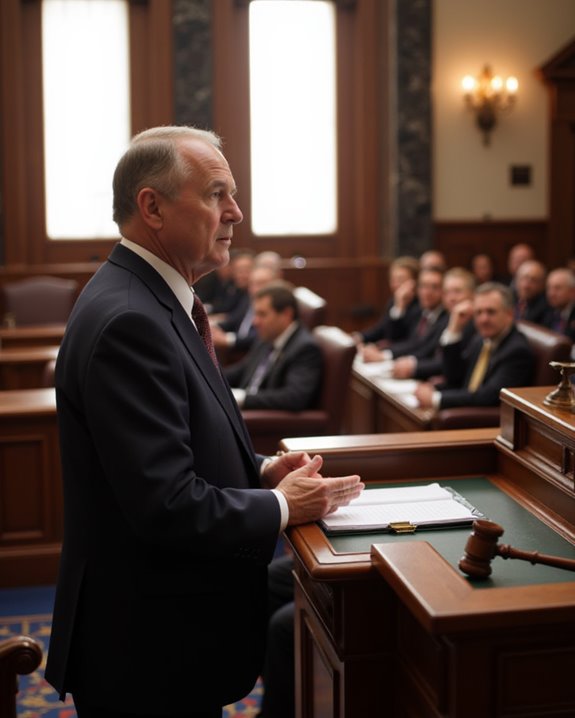
The Speaker of the House carries substantial legislative authority, functioning as both the procedural head of the chamber and a critical architect of congressional policy priorities. As leader of the body’s majority party, the Speaker usually determines which bills receive consideration, effectively controlling the legislative agenda. The Speaker presides over debates, maintaining parliamentary order, though this duty is instead delegated to members from the majority party for routine sessions.
While the Speaker usually does not personally participate in floor debates, they perform various essential functions, including committee appointments and institutions’ administrative oversight. The Speaker regularly makes decisions about procedural matters, ensuring efficient operation of the legislative process. In the presidential line of succession, the Speaker is second, underscoring the position’s constitutional significance beyond legislative responsibilities.
Position in Presidential Succession and National Security
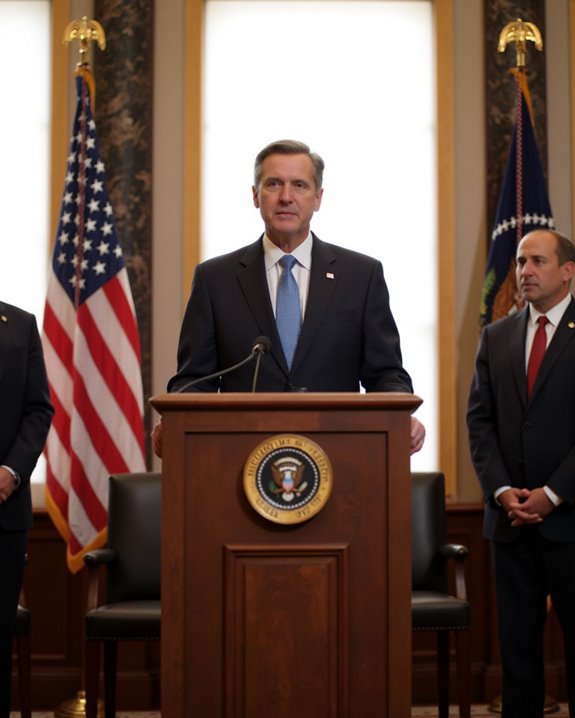
Under the Presidential Succession Act of 1947, the Speaker of the House stands second in line to assume the presidency, following only the Vice President, establishing an essential safeguard for governmental continuity during potential leadership crises. This vital position places the Speaker ahead of the Senate President Pro Tempore in the succession order, requiring immediate access to sensitive national security information. Should both the Democratic President and vice president become unable to serve, the Speaker would immediately assume executive duties, regardless of party affiliation. The Congressional Research Service has documented that every Speaker so far has been a sitting House member, ensuring institutional familiarity during changes. This succession protocol remains active even during government shutdowns, as demonstrated during tenures of Speakers like Nancy Pelosi and Tom DeLay.
Frequently Asked Questions
How Much Does the Speaker of the House Earn?
The Speaker of the House earns a salary of $223,500 annually. This compensation exceeds typical congressional pay, reflecting leadership responsibilities. Benefit packages and perks supplement this income, contributing to long-term wealth accumulation potential.
Can a Speaker Be Removed From Office Mid-Term?
Despite legal hurdles, a Speaker can be removed midterm through various means including impeachment grounds, party challenge, or a leadership vote. The removal process creates political instability and often triggers constitutional debate regarding ethical removal precedent analysis.
Has a Speaker Ever Become President Through Succession?
No speaker has become president through succession. Despite the speaker’s position in the line of succession, historical precedents show no instances of speaker ascendancy to the presidency through this constitutional route during crisis succession events.
Do Speakers Typically Maintain Their District Responsibilities?
Speakers substantially shoulder several simultaneous responsibilities. They maintain District Visits, Local Engagements, and Constituent Services while balancing broader Policy Focus. Representatives rely on Staff Management to handle Travel Schedules, Event Attendance, Voter Interaction, and Representation Duties during Reelection Efforts.
What’s the Average Tenure for Speakers Historically?
Historical data reveals Speaker durations vary across political eras. Tenure trends indicate an average service of approximately 4-5 years (2-3 election cycles), though historical patterns show significant term variations depending on leadership spans and prevailing party dynamics.

